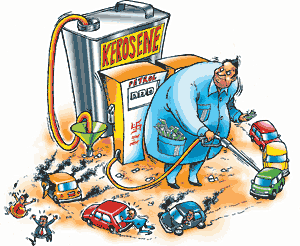 Next time you drive a car, remember: you are poisoning passersby and yourself. The failure of the state to apprehend and punish those involved in the nationwide adulteration of fuel is staggering. Fuel adulteration is one of the most blatant, open and obvious instances of corruption in Nepal today. And the government's failure to control it is a strongest indication that it is only paying lip service to combating corruption.
Next time you drive a car, remember: you are poisoning passersby and yourself. The failure of the state to apprehend and punish those involved in the nationwide adulteration of fuel is staggering. Fuel adulteration is one of the most blatant, open and obvious instances of corruption in Nepal today. And the government's failure to control it is a strongest indication that it is only paying lip service to combating corruption. The driving force behind adulteration is the price differential between subsidised kerosene, diesel and petrol. A weak penalty system of the state-owned monopoly, Nepal Oil Corporation, and lax monitoring have made fuel adulteration a lucrative exercise. There are huge profit margins, and no threat of punishment. And the whole system is so well lubricated with graft that everyone up and down the line gets his share.

A recent survey showed that there is a lot of room for manoeuvre for adulterators of fuel, since the "risk free" rate is 40 percent for petrol and 80 percent for diesel. This means that the amount that can be mixed within technical purity measurement parameters is huge. This margin appears to have been deliberately left wide to allow hanky panky. All this happens in collusion in a "public-private partnership" between the Nepal Oil Corporation, and retailers under the Nepal Petroleum Dealers' Association.
Fuel adulterers are not just cheating consumers. The impure fuel is turning our cities into gas chambers, reducing engine efficiency, weakening national productivity, and dragging the economy down. One conservative estimate is that the country loses Rs 1 billion a year just from the adulteration loss, not counting the health costs and other indirect loss of efficiency.
Risks from adulterated fuel are real, it is not some alarmist scientific theory. It affects you and me, everyone who walks or rides on our streets. It will affect us today, it will affect us tomorrow. The dangers add up, and are lethal.
There has been an exponential growth in the number of people with asthma in Kathmandu. This is a direct result of the soot particulates in the air from vehicle exhaust, which in turn is are a result of inefficient burning caused by adulteration. Another health problem is hypoxia, which is caused by lack of oxygen in the blood and is related to excessive carbon monoxide in the air, again caused by incomplete combustion. Hypoxia leads to fatigue and dizziness and is the cause of numerous traffic accidents.
The introduction of lead free petrol in Nepal has eliminated the danger of lead-but replaced it with benzene and toluene, both deadly carcinogens. These chemicals are added to lead-free petrol to raise the octane level, and should be trapped by catalytic converters in Euro II cars. However, the filters lose their efficacy because of the adulterated fuel.
To start doing something about this scourge, those who are involved in adulteration have to realise first that they are poisoning themselves. Those senior officials who are on the take have to see that their own lifespans are decreasing. And we consumers have to be aware of the dangers, and raise our voices in outrage.
After investigative reports came out in the media last year, the government set up a commission to look into the matter. But adulteration just got worse. The Ministry of Population and Environment decided to do something about it, and set up large billboards urging motorists to "tune their engines regularly". As if that would help. No government office has so far addressed the issue of fuel quality. There are strong indications that officials are in cahoots with the fuel adulteration mafia, even that the two are one and the same.
And yet, it is so easy to do something about it. All we need is political will. We can learn from neighbouring India, where the levels of corruption are no less than ours. But India has managed to curb adulteration through a "marker system". This method allows anyone to check the purity of the fuel at the sales point with a digital counter at nominal cost. After its initial success in Delhi and Bombay, the marker system is now going to be implemented all over India.
The marker system allows any consumer at a gas station to check the purity of the fuel in an ATM type machine where a 20 ml sample of oil in a test tube is inserted to check for purity. This simple method ensures that there is no chance of government authorities getting in the way. It is between the buyer and the seller, and the marker system ensures that the transaction is proper.
The architect of the anti-adulteration scheme is the Director of Research and Development of the Indian Oil Corporation, A K Bhatnagar. His team designed the system under which fuel is marked by a bio-coding method and the concentration of this marker is tested at the pump with a portable digital analyser. For the time being this is the best tamper-proof method we have of stopping fuel adulteration. But is there the political will to stop it?
(Chakra Khadka is associated with the Department of Economics at the Patan Campus.)



